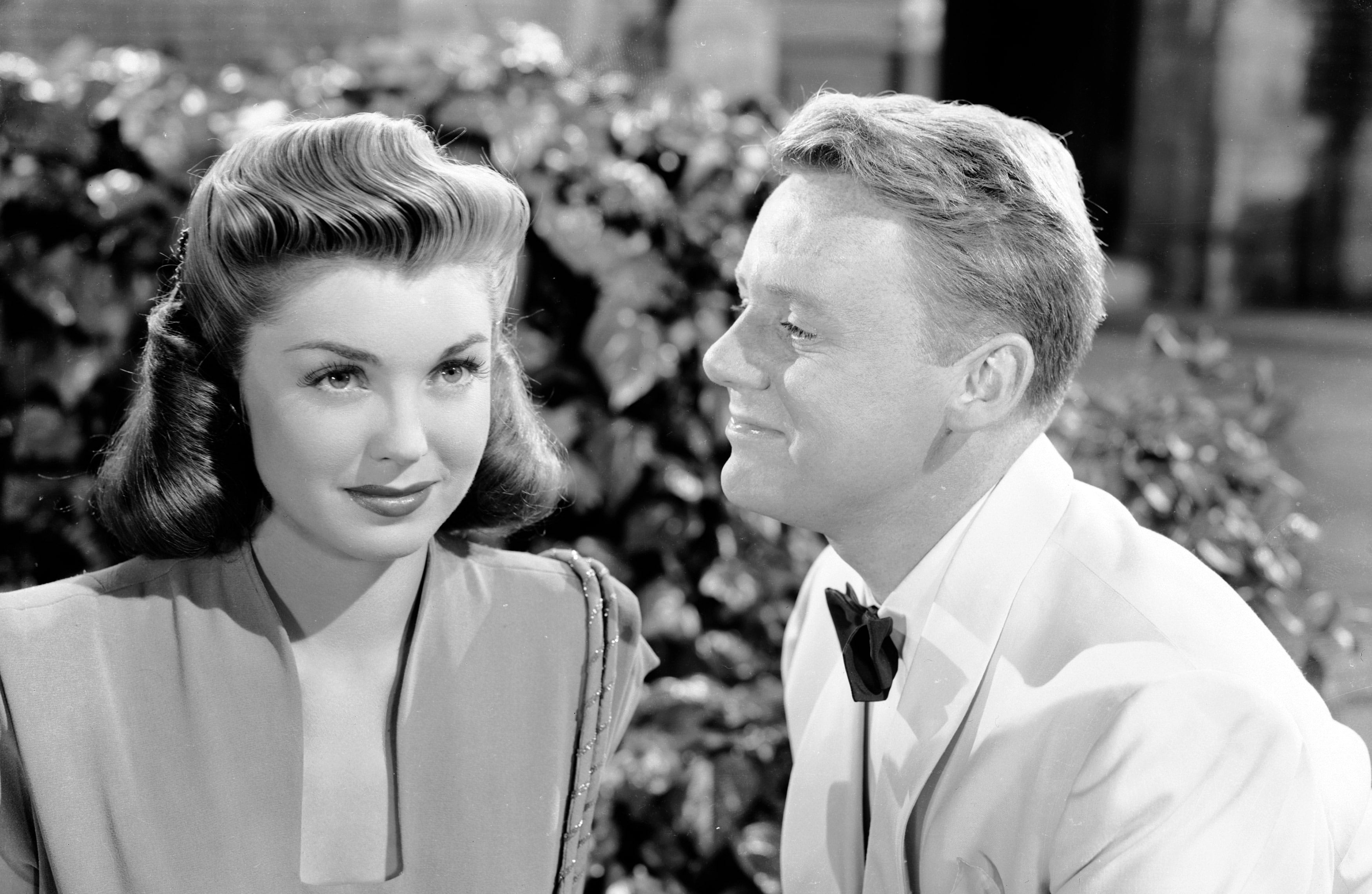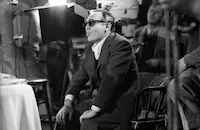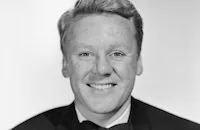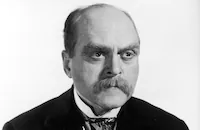Easy to Wed

Brief Synopsis
Cast & Crew
Edward Buzzell
Van Johnson
Esther Williams
Lucille Ball
Keenan Wynn
Cecil Kellaway
Film Details
Technical Specs

Synopsis
When his newspaper, The Morning Star , accidentally prints a libelous story about Connie Allenbury, the daughter of financial tycoon J. B. Allenbury, Farwood knows that he is in trouble. Infuriated by the newspaper's accusation that his daughter stole a woman's husband, Allenbury vows to file a $2,000,000 libel suit against the paper. Farwood, hoping to save his newspaper from ruin, calls on his business manager, Warren Haggerty, for help. Warren, who is engaged to marry Gladys Benton, calls off his wedding and quickly devises a plan to prevent the suit from advancing. The plan, which is to frame Connie as a co-respondent in a staged wife-stealing scheme, is initiated when Warren hires a former reporter at the newspaper, Bill Stevens Chandler, and prepares to send him to Mexico City, where the Allenburys are vacationing. Then, after assuring her that he will marry her as soon as he finishes his business with the Allenburys, Warren persuades Gladys to temporarily marry Bill in name only so that he can sue him for alienation of affection when a photograph of Bill and Connie is produced. Gladys and Bill are quickly married by a justice of the peace. Bill, accompanied by Warren's friend Spike, goes to Mexico, where he follows the Allenburys and takes a crash course in hunting, which is Allenbury's favorite hobby. At the Hotel Del Rey, Bill endears himself to Connie when he protects her from the unwanted attentions of Spike. Bill later introduces himself to Connie and her father as a writer and a hunting enthusiast. Allenbury quickly befriends Bill and sets a date for a duck hunting expedition. Days pass, and Gladys and Warren get impatient with Bill, who has not yet produced a picture of himself with Connie. Connie eventually realizes that Bill is faking his duck hunting experience when he arrives at the hunting grounds sporting brand new equipment. Bill and the Allenburys split into two boats for the hunt, and Bill is frustrated by his failure to shoot down a single duck. After hours of waiting in the boat with no success, a flock of ducks flies overhead, and, as Bill struggles with his rifle, a shot is accidentally fired into the air. The bullet strikes a duck, which falls from the sky and lands on Bill's head. Allenbury and Connie are impressed by the catch, and later serve the duck for dinner. A romance soon blossoms between Bill and Connie, but Bill, fearing that Gladys is getting impatient and is planning to expose him, stalls for time by feigning romantic interest in her. Suspecting that Bill is romancing Gladys, Warren decides to visit Connie and try to persuade her to drop the suit. After Connie refuses Warren's request, Warren telephones Gladys and tells her that Bill is romantically involved with Connie. Gladys, who believes she is in love with Bill, then goes to the Allenbury estate and tells Allenbury that Bill is her husband. Allenbury is shocked by the news and tells Connie, who tests Bill by asking him to marry her immediately. Bill consents, and they are married by a justice of the peace. Warren and Gladys threaten to expose Bill as a bigamist, but Bill prevents them from doing so by telling Gladys that he has learned that she is still legally married to a man named Joseph Simpson, and that her mail-order divorce was nullified. Gladys surprises Bill, though, when she tells him that she knows about the nullification and that she later got a legal divorce in Reno. All ends happily, though, when the Allenburys drop their suit, and when Gladys and Warren realize that they are truly meant for each other.

Director

Edward Buzzell
Cast

Van Johnson

Esther Williams

Lucille Ball

Keenan Wynn

Cecil Kellaway
Carlos Ramirez

Ben Blue
Ethel Smith
June Lockhart

Grant Mitchell
Josephine Whittell

Paul Harvey

Jonathan Hale

James Flavin
Sybil Merritt
Sondra Rodgers

Jean Porter
Celia Travers
Robert E. O'connor
Charles Sullivan
Frank Hagney
Brick Sullivan
Lloyd Ford
Arthur Walsh
Katharine Booth
Dick Winslow
Joel Friedkin
Marjorie Davies
Myron Speth
Paul Regas
Fernando Garcia
Tom Dugan
Fred Fisher
Alex Pollard
George Calliga

George Mann
Milton Kibbee
Katherine Black
Guy Bates Post
Charles Knight
John Valentine
Walter Soderling
Sarah Edwards
Chavo De Leon
Nina Bara
Mitzie Uehlein
Mildred Sellers
Phyllis Graffeo
Kanza Omar
Louise Burnette
Patricia Denise
Jack Shea
Dave Kashner
Augie Gomez
Crew
Jack Baker
Edward Baravalle
Ary Barroso
Ralph Blane
Jack Bonar
Jack Cummings
Jack Dawn
Jack Donohue
Ted Duncan
Osvaldo Farres
Pedro Galindo
Cedric Gibbons
A. Arnold Gillespie
Johnny Green
Johnny Green
Irene
Henri Jaffa
Natalie Kalmus
Marion Herwood Keyes
Dorothy Kingsley
Sam Leavitt
M. J. Maclaughlin
Jay Marchant
Inger Norswing
George Oppenheimer
Don Park
Ralph A. Pender
Hans Peters
Harry H. Poppe
Merrill Pye
Virginia Rees
George Richelavie
Howard Emmett Rogers
Blanche Sewell
Douglas Shearer
Robert W. Shirley
Raul Soler
Newell Sparks
William Steinkamp
Michael Steinore
P. R. Stevens
Harry Stradling
Valles
Maurine Watkins
Herman Webber
John A. Williams
Edwin B. Willis

Photo Collections
Videos
Movie Clip




Trailer
Film Details
Technical Specs

Articles
Easy to Wed
In the late 1930s, Ball had reigned as "Queen of the Bs" as an RKO contract player. Frustrated by her inability to get good parts, she moved to MGM in 1943, but after a promising start there in DuBarry Was a Lady (1943), she ended up just as frustrated, playing wisecracking sidekick roles. The part of Gladys in Easy to Wed, though not the romantic lead, offered her a chance to build a character, not just drop quips. She owed her chance to co-star in the film to two old friends.
Edward Buzzell, who had directed Ball in Best Foot Forward (1943), asked the studio to cast her in Easy to Wed. "Eddie Buzzell put me at my ease, and encouraged me to be myself in a way no other director had done before," Ball recalled in her posthumously published autobiography. "He saw the potential in me for humor and pathos I didn't even know I had."
Van Johnson, MGM's most popular younger leading man at the time, was also a close friend of Ball's. He had appeared with Desi Arnaz in Too Many Girls on Broadway, and along with Arnaz, had gone to Hollywood to appear in the 1940 film version at RKO, where they both met Ball. But Johnson's role in that film was small, and he was unable to get work in Hollywood. He decided to return to New York, and at a farewell dinner with Ball and Arnaz, they spotted MGM talent scout Billy Grady. The couple persuaded Grady to give their pal a chance, and MGM signed Johnson. A Guy Named Joe (1943) proved to be Johnson's breakthrough film, and by 1946, he was one of the studio's top moneymakers.
Keenan Wynn had played opposite Ball in Without Love (1945), and was Johnson's best friend (Wynn's wife, Evie, divorced him in 1947 to marry Johnson, but it apparently didn't damage the friendship). And Johnson and Esther Williams had recently co-starred with great success in Thrill of a Romance (1945). Dance director Jack Donohue had also worked with Ball and Buzzell on Best Foot Forward (Donohue would later direct episodes of The Lucy Show and Here's Lucy). So the atmosphere during the production of Easy to Wed was friendly and jokey. On the first day of dance rehearsals, Ball showed up in a wheelchair, one arm in a sling, her teeth blacked out, holding a sign that read, "I am not working for Donohue."
Easy to Wed was one of the top box office hits of 1946, and Ball earned the best reviews of her career. According to Cue magazine," She steals every scene she plays." The Los Angeles Times critic wrote, "She is at her super best." The New York Times critic Bosley Crowther singled out Ball and Wynn for praise. "Both of these pleasant young people have exceptionally keen comedy sense ....Together they handle the burdens of the cleverly-complicated plot and throw their voices and their torsos into an almost continuous flow of gags." The Associated Drama Guild of America named Ball and Danny Kaye "King and Queen of Comedy - 1946."
Ball herself called Easy to Wed "one of the highlights of my movie career." But she also noted, "After knocking myself out, giving my best possible performance in this picture, I expected other good roles to follow. Instead, I was put into a real dog with John Hodiak called Two Smart People [1946]." Ball's contract was up for renewal soon, and in spite of Easy to Wed's success, the handwriting was on the wall about her future at MGM. Ball's husband, Desi Arnaz, had recently been discharged from the army, and was hoping to resume his film career at MGM, where he had remained under contract during the war. But he found that in his absence, the studio was grooming Ricardo Montalban for the musical Latin lover roles that might have gone to Arnaz. So the couple decided to try their luck elsewhere. Arnaz put together a band and took up a nightclub career, and Ball freelanced in films. Together, they also co-starred in a radio comedy, My Favorite Husband, and within five years, they turned to the new medium of television. It was only after I Love Lucy had become a huge hit that they returned to MGM to co-star in two feature films, The Long, Long Trailer (1954) and Forever, Darling (1956).
Director: Edward Buzzell
Producer: Jack Cummings
Screenplay: Dorothy Kingsley, based on the screenplay Libeled Lady, by Maurine Dallas Watkins, Howard Emmett Rogers and George Oppenheimer
Cinematography: Harry Stradling
Editor: Blanche Sewell
Costume Design: Irene
Art Direction: Cedric Gibbons, Hans Peters
Music: Johnny Green
Principal Cast: Van Johnson (Bill Stevens Chandler), Esther Williams (Connie Allenbury), Lucille Ball (Gladys Benton), Keenan Wynn (Warren Haggerty), Cecil Kellaway (J.B. Allenbury), Ben Blue (Spike Dolan), June Lockhart (Babs Norvell).
C-110m. Closed captioning.
by Margarita Landazuri

Easy to Wed
TCM Remembers Van Johnson - Important Schedule Change on TCM In Honor To Salute VAN JOHNSON
The new schedule for the evening of Tuesday, December 23rd will be:
8:00 PM In the Good Old Summertime
9:45 PM A Guy Named Joe
12:30 AM Thirty Seconds Over Tokyo
2:30 AM The Last Time I Saw Paris
4:30 AM Thrill of a Romance
Van Johnson (1916-2008)
Van Johnson, the boyish leading man whose clean cut, All-American appeal made him a top box-office draw for MGM during World War II, died on December 12 in Nyack, New York of natural causes. He was 92.
He was born Charles Van Dell Johnson on August 25, 1916, in Newport, Rhode Island. By his own account, his early childhood wasn't a stable one. His mother abandoned him when he was just three and his Swedish-born father offered little consolation or nurturing while he was growing up. Not surprisingly, Johnson found solace in singing and dancing lessons, and throughout his adolescence, he longed for a life in show business. After graduating high school in 1934, he relocated to New York City and was soon performing as a chorus boy on Broadway in shows such as New Faces of 1936 and eventually as an understudy in Rodgers and Hart's musical, Too Many Girls in 1939.
Johnson eventually made his way to Hollywood and landed an unbilled debut in the film version of Too Many Girls (1940). By 1941, he signed a brief contract with Warner Bros., but it only earned him a lead in a "B" programmer Murder in the Big House (1941); his contract soon expired and he was dropped by the studio. Johnson was on his way back to New York, but as luck would have it - in the truest Hollywood sense - friends Lucille Ball and Desi Arnaz introduced him to Billy Grady, a lead talent scout at MGM, which was currently Ball's new studio. Johnson was signed up and almost immediately MGM had a star on its hands.
It might have been slow going at first, with Johnson playing able support in films such as Dr. Gillespie's New Assistant and The War Against Mrs. Hadley (both 1942). By 1943 the studio capitalized on his broad smile and freckles and starred him in two of the studio's biggest hits: A Guy Named Joe and The Human Comedy. Those two films transformed him into a boxoffice draw with a huge following, particularly among teenage girls. A near fatal car accident that same year only accentuated the loyalty of his fans, and his 4-F status as the result of that accident created an opportunity for him when so many other leading actors of the era (James Stewart, Clark Gable) were off to war. Johnson was quickly promoted as MGM'sleading man in war heroics and sweet romancers on the big screen: The White Cliffs of Dover, Thirty Seconds Over Tokyo (both 1944), Thrill of a Romance, the episodic Week-End at the Waldorf (both 1945), and a musical remake of Libeled Lady entitled Easy to Wed (1946).
Hits though these were, it wasn't until after the war that Johnson began to receive more dramatic parts and better material such as supporting Katharine Hepburn and Spencer Tracy in the political farce State of the Union (1948). other significant roles included the well-modulated noir thriller The Scene of the Crime, the grim war spectacle Battleground (both 1949), the moving domestic drama Invitation (1952) in which he played a man who is paid to marry a woman (Dorothy McGuire) by her father. Before he left MGM, he closed his career out in fine form with the sweeping musical Brigadoon, co-starring Gene Kelly and Cyd Charisse; and the lilting soaper The Last Time I Saw Paris (both 1954) with Elizabeth Taylor.
After he left MGM, the parts that came Johnson's way weren't as varied, but he had his moments in The Caine Mutiny (1954), the beguiling romance drama Miracle in the Rain (1956) with Jane Wyman; and his lead performance in one of the first successful made for-TV-movies The Pied Piper of Hamelin (1957). By the '60s, Johnson returned to the stage, and played the title role in London's West End production of The Music Man. He then returned to Broadway in the drama Come on Strong. He still had a few good supporting parts, most notably as Debbie Reynolds' suitor in Norman Lear's scathing satire on marital differences Divorce American Style (1967); and television welcomed his presence on many popular shows in the '70s and '80s such as Maude, Fantasy Island, The Love Boat and of course Murder She Wrote. There was one last graceful cameo in Woody Allen's The Purple Rose of Cairo (1985), yet for the most remainder of his career, Johnson worked mainly on the dinner theater circuit before retiring from showbiz completely by the mid-90s. He is survived by a daughter, Schuyler.
by Michael T. Toole
TCM Remembers Van Johnson - Important Schedule Change on TCM In Honor To Salute VAN JOHNSON
Quotes
Trivia
Notes
Working titles for this film were Libeled Lady and Early to Wed. A November 1944 Hollywood Reporter news item noted that actor Frank Morgan was cast, but he did not appear in the final film. Pre-production news items in Hollywood Reporter indicate that art director Merrill Pye and unit manager Jay Marchant completed the filming of backgrounds in Mexico City in late November 1944. According to a January 1946 Hollywood Reporter news item, M-G-M decided not to include the song "I'm Gonna Fall in Love with You," which had been set for Van Johnson, due to concerns about audience reaction to Johnson's singing voice. Although the news item also reported that M-G-M had shelved plans to use the slogan "Van Johnson Sings" in its exploitation campaign, the picture does feature Johnson singing a duet with Esther Williams. According to an unidentified, but contemporary item in the file on the film in the AMPAS Library, Williams was to sing "Can't I Do Anything But Swim," a parody of "Everything Happens to Me," which was written by Harriet Lee, as well as "Guabina chinquinquirerna." Easy to Wed was a remake of the 1936 M-G-M picture Libeled Lady, directed by Jack Conway and starring Jean Harlow, William Powell, Myrna Loy and Spencer Tracy (see AFI Catalog of Feature Films, 1931-40; F3.2474). Johnson and Williams recreated their roles for a Lux Radio Theatre version of the story, which was broadcast on February 27, 1950.















